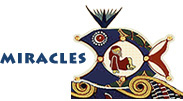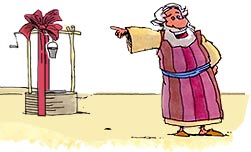

The concept of God as parent or father is expressed in another rabbinic
passage that portrays God taking pleasure in seeing His children outsmart
Him. Here, Rabbi Eliezer is arguing an unpopular position on a relatively
obscure matter of Jewish law with his colleague Rabbi Joshua. Rabbi Joshua,
along with the rest of the sages in the rabbinic court, reaches a conclusion
from which Eliezer vigorously dissents. Unwilling to concede, Eliezer
resorts to some extraordinary measures to persuade Joshua and the majority
of his rightness. After he performs three sets of miracles and Joshua
is still not persuaded, Rabbi Eliezer appeals to God directly, who quite
forcefully states that Eliezer's legal rulings are to be followed in this
and every other case. Despite the authoritative statement by God that
Eliezer has carte-blanche legal authority, Joshua is still not persuaded.
He even chastises God by quoting God's own words, albeit out of context,
against Him. He first admonishes God that He has no standing in courts
of Jewish law after the Torah was given once and for all at Mount Sinai.
Joshua quotes the Torah against God, the lawgiver, by reminding God that
He has transferred all legal authority to the rabbis and established the
principle of majority rule as their guide. The controversy ends with Joshua
victorious over Eliezer and even over God, who accepts that He can no
longer intervene in disagreements among His children:
 |
| And
from there to Be'er, which is the well where the LORD said to Moses,
"Assemble the people that I may give them water."[2]
|
|
One day
Rabbi Eliezer was in dispute with the other sages on a matter of law.
He brought all the proofs of the world in support of his opinion but the
other sages would not accept them. He said to them: "If the law is
according to me, let this locust tree prove it." And the locust tree
moved one hundred cubits. (Some say four hundred cubits.) The sages said
to him: "The locust tree cannot prove anything." Then he said
to them: "If the law is according to me, let this stream of water
prove it." And the stream of water turned and flowed backward. They
said to him: "The stream cannot prove anything." Then he said
to them: "If the law is according to me, let the walls of the house
of study prove it." The walls of the house of study began to topple.
Rabbi Joshua reprimanded the walls:
"If scholars
are disputing with one another about the law, what business is it of yours?"
The walls did not fall down out of respect for Rabbi Joshua and did not
straighten up out of respect for Rabbi Eliezer. They are still so inclined!
Then Rabbi Eliezer said to them: "If the law is according to me,
let the heavens prove it:" A voice then came forth from heaven and
said: "Why do you dispute with Rabbi Eliezer? The law is according
to him in every case." Thereupon, Rabbi Joshua rose to his feet and
said: "'It is not in heaven'.[1]
The Torah has been given once and for all at Mount Sinai. For You have
already written in the Torah at Mount Sinai: `After the majority one must
incline'.[2]
" Later on, Rabbi Nathan came upon Elijah the Prophet. He said to
him: "What was the Holy One, Blessed be He, doing at that moment?"
Elijah said to him: "He was smiling and saying: `My children have
defeated Me! My children have defeated Me!"'[3]
The passage attributes
to God the natural parental inclination to intervene in disputes among
His children. At the same time, God as a wise parent admits that His children
are mature enough to resolve matters without His involvement. The passage
admonishes God for not exercising greater self-restraint in remaining
apart from human affairs. He is asked to abide by His own self-imposed
restrictions, which include respect for the autonomy of human activity
and judgment, nonintervention in the world, and avoidance of miracles.
Miracles represent
a violation of the normal relationship between God and the world. Usually
God acts indirectly and predictably by allowing events to occur in response
to human behavior and in such a way that the effect is proportionate to
the cause. Good actions are rewarded and bad actions are punished. Miracles,
on the other hand, are unpredictable, direct, and disproportionate results
of the incursion of the transcendent God into the world. Both Rabbi Eliezer
and Rabbi Joshua accept the occurrence of miracles but they differ on
their relevance to Jewish legal debates. Rabbi Eliezer thinks that miracles
and the power of the transcendent God can prove his case. Rabbi Joshua
is unmoved by the miracles because he believes that they are irrelevant
to the legal process of deciding matters of Jewish law; only the majority
rule of court of law has standing. Along the way, however, Rabbi Joshua
decides to show that he too can perform miracles, if only to show that
they are legally worthless.
|
[1]
Deuteronomy 30:12 [back]
[2] Exodus 23:2 [back]
[3] Bava Metzia 59b [back]
|
|
 From:
David S. Ariel, What do Jews Believe? The Spiritual Foundations of Judaism
(New York, Schocken Books, 1995), pp. 25-27. From:
David S. Ariel, What do Jews Believe? The Spiritual Foundations of Judaism
(New York, Schocken Books, 1995), pp. 25-27.
Permisison of David S. Ariel and Schocken books |
|